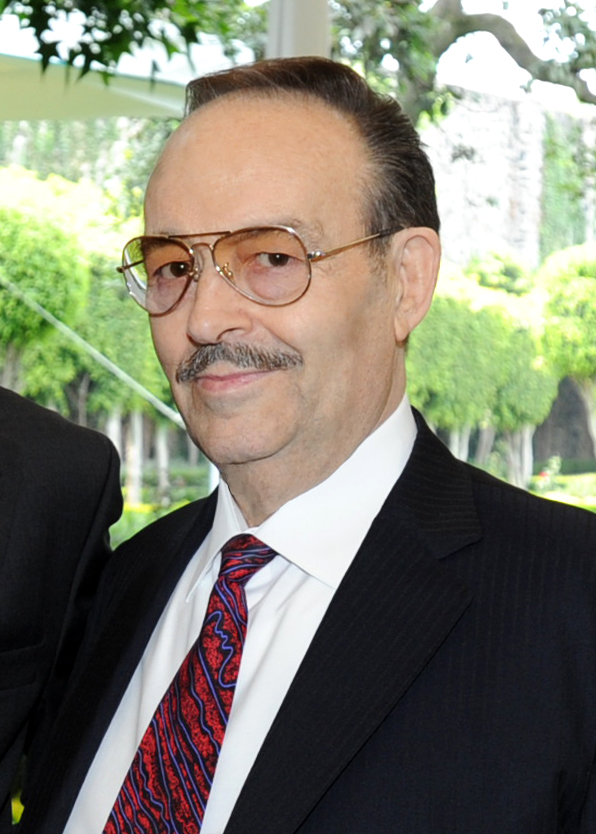Mario Vazquez Raña of Mexico died Sunday. He was 82. With him goes an era. Don Mario was indisputably the most important man in the Olympic movement in the entire western hemisphere. His ways may have been old-fashioned but his love for the movement and the so-called “Olympic family” were unquestioned. His counsel served International Olympic Committee presidents Juan Antonio Samaranch and Jacques Rogge. His jet, too.
Unclear now is who is positioned to take Vazquez Raña’s place in the Americas, if anyone. The 2016 Summer Games are of course in Brazil. The United States is bidding for the 2024 Summer Games, with that election in 2017. The 2015 Pan American Games are in Canada.
There are four primary languages at issue — Spanish, English, Portuguese and French.
The central issue is that there is no one — no one— quite like Don Mario.
International Olympic Committee president Thomas Bach told Associated Press “we will always remember him as a great Olympic leader,” declaring the Olympic flag at IOC headquarters at the lakeshore Chateau de Vidy would be flown at half-mast in his honor.
"The Olympic family in Mexico and indeed the world are mourning this loss,” the president of the Mexican Olympic Committee, Carlos Padilla Becerra, said in a statement.
U.S. Olympic Committee chairman Larry Probst said he was “deeply saddened” to hear of Vazquez Raña’s passing. “Mario,” he said, “served the Olympic movement for the majority of his adult life, and advanced Olympic sport in the western hemisphere like few before him.”
“Mario was a legendary leader, a dear friend and an esteemed colleague,” added Marcel Aubut, president of the Canadian Olympic Committee.
Vazquez Raña was much-misunderstood by many.
In part, that is because he preferred to operate almost exclusively in Spanish. In part, that is because he was an operator, in every sense of the word. In part, it is because — though he was a media magnate and himself interviewed hundreds if not thousands of world leaders, dignitaries and celebrities, enough to fill a nine-volume set of hardbound books and more — he permitted only a handful of English-speaking reporters, if that many, into his inner circle.
When he was in Mexico City, that circle invariably met for lunch every day in his offices. This was where the matters of the world, the state, the Olympic movement, the Olympic family and, perhaps most important, family were discussed.
To Don Mario, if you were in his circle of trust, you were in.
Criticism was OK — it was a part of life, as long as it was fair, reasoned and straightforward. He knew and accepted criticism.
Indeed, he sometimes sought criticism. Only fools, he would say, did not want criticism. Nobody got along with just yes people.
Trust — now trust was a commodity to be earned, over time.
Don Mario had the trust of Samaranch, the IOC president from 1980-2001, and then Rogge, president from 2001-13.
Samaranch used to say that the harmony of the Olympic movement used to depend on three “pillars” — the IOC itself , the international federations and the national Olympic committees. But when Vazquez Raña took over the Assn. of National Olympic Committees in 1979, that third pillar was comparatively weak.
Under his leadership, it became a force. Him, too.
For years he oversaw the IOC’s Olympic Solidarity commission, which oversaw the disbursement of hundreds of millions of dollars in aid to developing nations in a bid to get promising athletes to the Games.
He served as ANOC head for 33 years.
“An anecdote may illustrate his love for sports,” said Eduardo Palomo, president of the El Salvador Olympic Committee.
Just two years ago, on a tour of four South American countries in six days to evaluate sites for the 2019 Pan Am Games, Palomo said, Vazquez Raña “shared his middle school years.” He told how when “during recess he went to his family’s store to work, his classmates made fun of him.
“Later, he hired them to work for him.”
The intensity of the four-countries-in-six-days trip, Palomo said, “left no room for mistakes or leisure.” Vazquez Raña was “always punctual, always focused on demanding excellence for the Games in the same proportion he was giving of himself.”
Two and a half years ago, the winds of change finally caught up with Don Mario. He gave up control of ANOC; it is now headed by Sheikh Ahmad al-Fahad al-Sabah of Kuwait, who is arguably now the consummate IOC insider.
Vazquez Raña, meanwhile, stayed on in the Olympic world as head of the Pan American Sports Organization.
Recently, he missed a PASO meeting in Puerto Vallarta, Mexico — a sign he truly was ailing.
Jimena Saldaña worked with Don Mario for — to be precise — 30 years and two months. She is now first vice-president of the Mexican Olympic Committee, secretary-general of PASO, a member of the executive committee of PASO and a member, too, of the IOC Solidarity Commission.
When Vazquez Raña could not go to Puerto Vallarta, she said, he “called me and said, how is everybody, are they happy with their accommodations, that kind of thing — the Olympic family, is the transportation doing fine, the little details.
“I don’t think that in his mind anything gave him such satisfaction as the Olympic movement.”
She had last seen him, along with her husband, on Friday.
“He woke up and greeted me. We shook hands, he smiled. We said it was such a beautiful day, said we were happy he could look out on such a beautiful garden. We asked how he was doing. He said, ’So-so.’
“I kissed him and said, ‘See you tomorrow.’ He said, ‘Come back tomorrow.’ ”
“I was happy I could see him again.”
Don Mario died at 1 p.m. Sunday.


